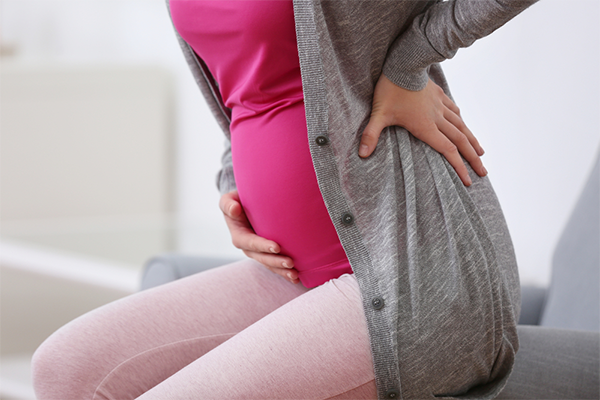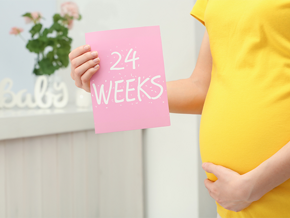
16 Weeks Pregnant: Your Guide to First Flutters and Big Changes
You're relaxing on the sofa when you suddenly feel a tiny flutter in your belly, almost like a bubble popping. Yes, it’s your baby’s first hello! Now that you’re 16 weeks pregnant, your little one is making big developmental leaps. Here’s a guide on what to expect in your fourth month.
Your Baby’s Progress at 16 Weeks
Your baby is taking a significant leap forward this week, becoming stronger and more active every day.
Size and growth
At Week 16, your baby is now about 11 to 12 cm (4.5 in) long from crown to rump, and weighs nearly 100 g, roughly the size and weight of an avocado. Their skeleton is beginning to harden from rubbery cartilage into bone, and their tiny toenails are starting to form.
Developing senses and new expressions
Your baby can now make various expressions. Though their eyelids remain fused shut for protection, their eyes can also perceive light. They may turn away if you shine a bright flashlight on your belly.
Your baby is typically in a heads-up position but shift often since they have room to twist and turn.
First movements
When you’re 16 weeks pregnant, you might start to feel your baby's first subtle movements, an experience known as quickening. These can feel like gentle taps, bubbles, or a butterfly fluttering in your abdomen.
That said, you might not identify these sensations until a few weeks later if this is your first pregnancy.
Gender
A 16-week scan isn't usually part of the routine check-up schedule. But you may find out your child's gender during the congenital anatomy scan, which typically happens mid-pregnancy or around Week 20. This detailed ultrasound checks your baby’s development from head to toe.
What You Can Expect: Your Body at 16 Weeks

Backaches and round ligament pain are common as your uterus expands. Gentle stretching can help provide relief.
At 16 weeks pregnant, symptoms can vary as your body settles into the second trimester. Some early discomforts may subside, while new ones emerge.
Your growing belly
By now, your bump is likely more noticeable. Your uterus is expanding to accommodate your growing baby, which can cause your lower abdomen to feel heavier and more rounded.
Common aches and pains
Your expanding uterus has been putting pressure on your ligaments. You may experience sharp, jabbing pains in your lower abdomen or groin, known as round ligament pain.
Backaches are also extremely common. A systematic review in BMC Pregnancy and Childbirth confirmed that nearly 40% of women experience back pain during pregnancy, mainly due to hormonal changes and a shifting center of gravity.
Changes in your skin and discharge
You might notice that your skin is glowing, a side effect of increased blood circulation. However, you may also see a temporary dark line on your belly (linea nigra), a common skin change caused by pregnancy hormones that typically fades after childbirth.
An increase in thin, milky-white discharge (leukorrhea) is a regular part of pregnancy. However, if the discharge has a foul odor, is yellow or green, or is accompanied by itching or burning, contact your doctor.
Lingering nausea and swelling
While vomiting at 16 weeks pregnant often lessens as morning sickness subsides, you may continue to experience it. Additionally, swelling of the feet can occur due to fluid retention.
Your Guide to a Comfortable Pregnancy
With so many changes happening, focusing on your well-being matters more than ever.
Find the best sleep position
How to sleep at 16 weeks pregnant comfortably? Experts from the Sleep Foundation recommend sleeping on your left side with your knees bent. This position improves blood flow and nutrient delivery to the placenta and can help reduce swelling by supporting kidney function.
Try using pillows to support your back and between your knees for extra comfort.
Stay active and comfortable
A study published in PLOS One found that pregnant women with stronger leg and glute muscles experienced significantly less low back pain. If your doctor allows, consider incorporating safe and simple exercises, such as prenatal squats and glute bridges, to help build strength and support your growing belly.
Gentle exercises, such as walking, swimming, or prenatal yoga, are also great ways to boost your energy and mood. As your bump grows, invest in maternity wear and the right bra for all-day comfort and support.
Nourish your body
As your baby's bones harden, focus on calcium-rich foods like yogurt and leafy greens. To support your increased blood volume, also ensure you are getting enough iron from sources like lean meat, beans, and fortified cereals.
Prepare for your next check-up
Your prenatal appointments are the perfect opportunity to ask any questions you may have. Keep a list of questions for your doctor, from symptoms to preparing for the baby.
When to Contact Your Doctor

Never hesitate to call your doctor if you experience concerning symptoms like severe cramping or heavy bleeding.
Many symptoms are typical during pregnancy, but some require immediate medical attention. Call your doctor or head to the hospital if you experience:
- Severe abdominal cramping or sharp, persistent pain
- Heavy vaginal bleeding
- Sudden or severe swelling in your hands, face, or feet
- A severe headache that doesn’t go away
- Vision changes with headache
- Pain or burning during urination
- Fever or chills
Being 16 weeks pregnant is a time of excitement and growth. You're likely feeling more energetic, your bump is making its debut, and you might even feel your baby's first flutters. By staying informed, you can confidently embrace all the changes this week brings on your path to parenthood.
Connect with other parents on the ParentTeam Moms and Dads Facebook group and share your experiences as you prepare for your baby at 16 weeks pregnant.
References
American College of Obstetricians and Gynecologists (ACOG). “How Your Fetus Grows During Pregnancy.” January 2024. Accessed July 14, 2025. https://www.acog.org/womens-health/faqs/how-your-fetus-grows-during-pregnancy
Cleveland Clinic. “Fetal Development: Stages of Growth.” Last reviewed March 19, 2024. Accessed July 14, 2025. https://my.clevelandclinic.org/health/articles/7247-fetal-development-stages-of-growth
Kearin, Manette, Karen Pollard, and Ian Garbett. “Accuracy of Sonographic Fetal Gender Determination: Predictions Made by Sonographers During Routine Obstetric Ultrasound Scans.” Australasian Journal of Ultrasound in Medicine 17, no. 3 (2014): 125–30. https://doi.org/10.1002/j.2205-0140.2014.tb00028.x
NHS. “Week 16 – Your Pregnancy and Baby Guide.” Start for Life. Last reviewed December 13, 2023. Accessed July 14, 2025. https://www.nhs.uk/start-for-life/pregnancy/week-by-week-guide-to-pregnancy/2nd-trimester/week-16/
Planned Parenthood. “What Happens in the Fourth Month of Pregnancy?” n.d. Accessed July 14, 2025. https://www.plannedparenthood.org/learn/pregnancy/pregnancy-month-by-month/what-happens-fourth-month-pregnancy




























